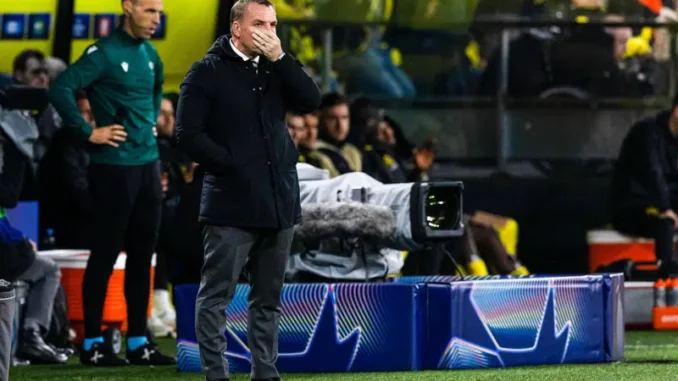
Scotland’s Coefficient Piles Up the Evidence Against Brendan Rodgers
Brendan Rodgers, back at the helm of Celtic, is under mounting scrutiny as Scotland’s UEFA coefficient continues to expose the challenges faced by Scottish clubs in European competitions. Once hailed for his domestic dominance during his first stint with Celtic, Rodgers now faces increased pressure to deliver on the continental stage—a realm where Scottish football has struggled, and where Rodgers’ European record has often been a point of contention.
Scotland’s UEFA coefficient is a critical factor in determining how many clubs the country can send to European competitions and which rounds they enter. For years, Scottish clubs have struggled to make significant inroads in Europe, with Rangers and Celtic occasionally punching above their weight but often failing to progress beyond the group stages of the UEFA Champions League and Europa League. This underperformance has contributed to a stagnation in the coefficient ranking, which in turn impacts future seeding and qualification prospects for Scottish teams.
Rodgers, despite his success domestically during his first spell with Celtic from 2016 to 2019, did little to improve the club’s standing in Europe. His tenure was marked by disappointing exits in the Champions League qualifying rounds and underwhelming Europa League campaigns. While Celtic enjoyed a record-breaking unbeaten domestic season under Rodgers, their European ventures were far less impressive. High-profile defeats, including a 7-0 thrashing by Barcelona and a 7-1 loss to Paris Saint-Germain, raised questions about the team’s ability to compete at the highest level.
Now, with Rodgers back in charge, the stakes are higher than ever. Scotland’s UEFA coefficient remains fragile, and recent struggles by Scottish teams in Europe have done little to boost it. Celtic’s performances in Europe under Rodgers are seen by many as a key reason why Scotland has failed to climb higher in the rankings. The club’s inability to consistently reach the latter stages of European competitions has hurt not only their reputation but also the country’s overall standing in Europe.
Critics argue that Rodgers’ tactical approach in Europe has been too cautious or, at times, naïve. While his possession-based style of play has worked wonders domestically, it has often been exposed against the high-pressing, technically superior teams in Europe. This mismatch in approach has seen Celtic fail to adapt in crucial moments, leading to damaging losses that pile up and negatively affect the coefficient.
In contrast, Rangers under Steven Gerrard, and more recently Michael Beale, have had more success in European competition, reaching the Europa League final in 2022. Their strong showings, including knockout victories over high-profile clubs, have helped boost Scotland’s coefficient. Gerrard’s European success highlighted the gap between the two Glasgow clubs in Europe during Rodgers’ tenure, further intensifying the pressure on the Celtic manager.
The coefficient debate is not just a numbers game—it is also a reflection of Scotland’s standing in European football. For Celtic and Rodgers, it underscores the need to improve performances on the continental stage. The club’s failure to progress beyond the group stages of the Champions League in recent years has left fans frustrated and questioning whether Rodgers can lead the team to success in Europe.
This season, with Celtic back in the Champions League under Rodgers, the pressure to deliver has never been greater. With Scotland’s coefficient hanging in the balance, every point matters, not just for Celtic but for the future of Scottish football in European competitions. Success or failure in the Champions League will have lasting implications, and Rodgers will need to prove that he has learned from past mistakes if he is to lead Celtic to the heights that their supporters expect.
As the coefficient continues to reflect Scotland’s European struggles, it piles up the evidence against Brendan Rodgers, placing him at the heart of the debate about the country’s footballing future in Europe. With every match, Rodgers’ ability to turn Celtic into a European force will be scrutinized—and the success or failure of that mission could define his legacy in his second spell at the club.
Read more on;https://sportupdates.co.uk

Leave a Reply